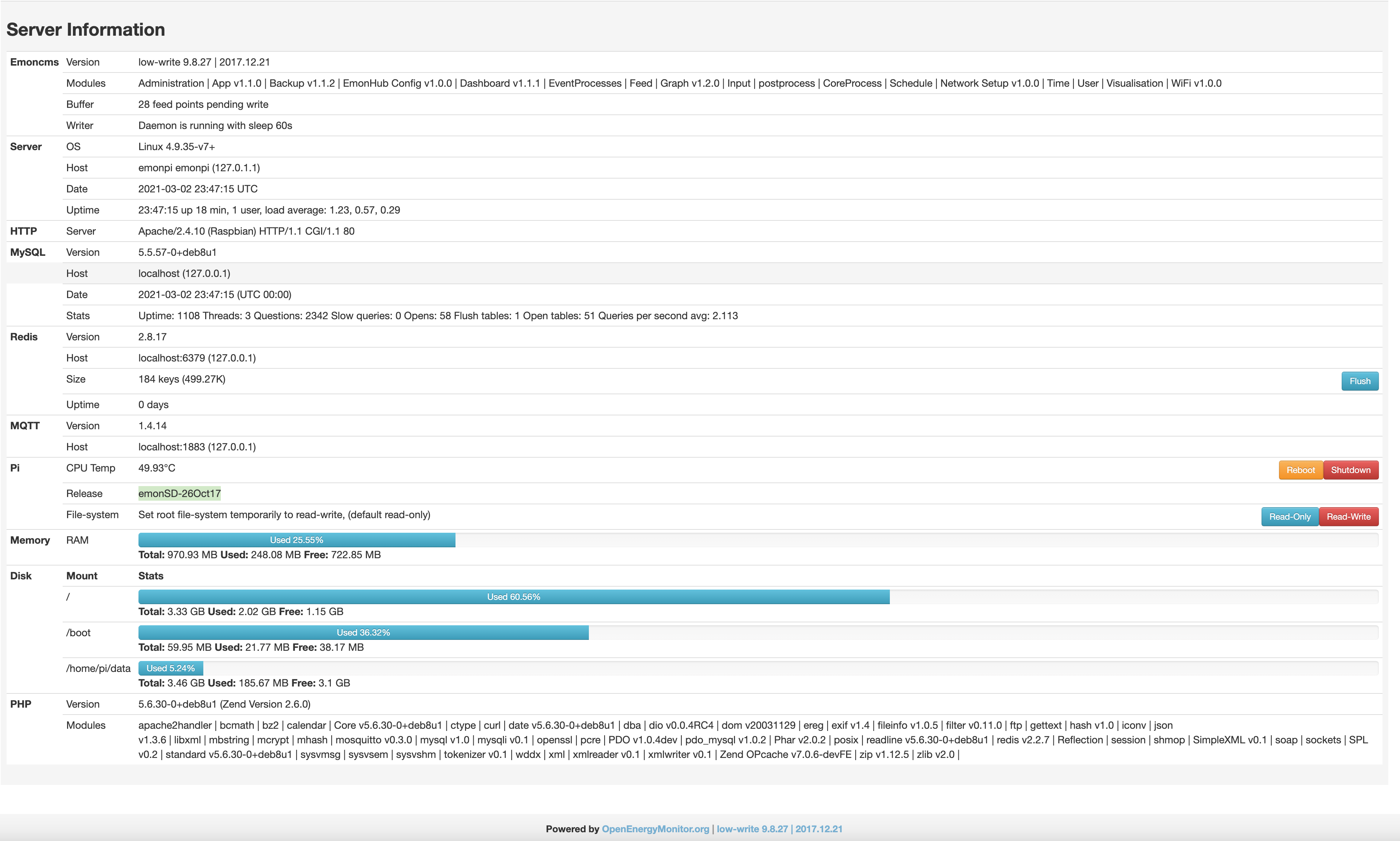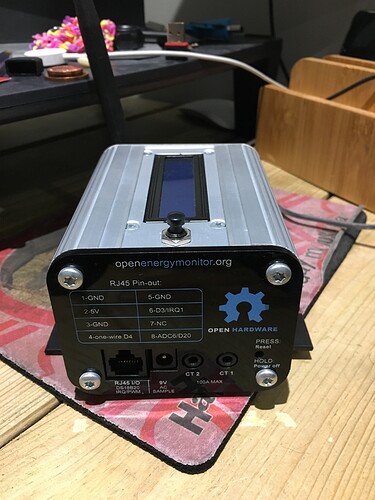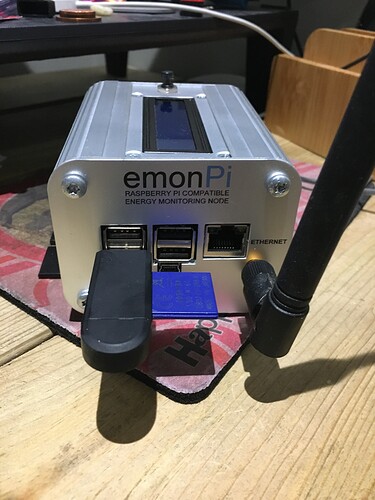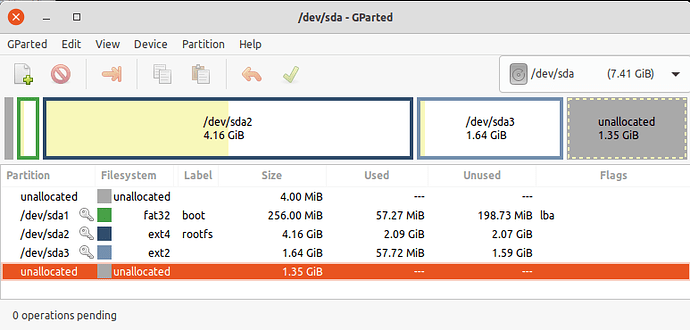Hi All,
I was wondering if I could ask for some general pointers in upgrading my old emon Pi which is running emonSD-26Oct17.
I can see several support articles which advise that the automatic upgrade will not work due to the old version I am running so I have performed the following to no avail:
- Followed this upgrade guide: [Update & Upgrade - Guide | OpenEnergyMonitor]
I am using a new SD card (16GB) and have opted to flash this using Etcher and have installed the latest SD-24Jul20 img which I downloaded recently.
I can see the /boot directory on the SD Card and when I plug this in to my Emon PI I see the following:
pi@emonpi(ro)data$ **dmesg**
[ 1601.306962] usb 1-1.4: New USB device found, idVendor=aaaa, idProduct=8816
[ 1601.306977] usb 1-1.4: New USB device strings: Mfr=1, Product=2, SerialNumber=3
[ 1601.306985] usb 1-1.4: Product: MXT USB Device
[ 1601.306992] usb 1-1.4: Manufacturer: MXTronics
[ 1601.307000] usb 1-1.4: SerialNumber: 150101v01
[ 1601.308169] usb-storage 1-1.4:1.0: USB Mass Storage device detected
[ 1601.308538] scsi host0: usb-storage 1-1.4:1.0
[ 1602.346967] scsi 0:0:0:0: Direct-Access MXT-USB Storage Device 1501 PQ: 0 ANSI: 0 CCS
[ 1602.348273] sd 0:0:0:0: Attached scsi generic sg0 type 0
[ 1602.348962] sd 0:0:0:0: [sda] 31719424 512-byte logical blocks: (16.2 GB/15.1 GiB)
[ 1602.349250] sd 0:0:0:0: [sda] Write Protect is off
[ 1602.349263] sd 0:0:0:0: [sda] Mode Sense: 03 00 00 00
[ 1602.349544] sd 0:0:0:0: [sda] No Caching mode page found
[ 1602.349554] sd 0:0:0:0: [sda] Assuming drive cache: write through
[ 1602.352442] sda: sda1 sda2 sda3
[ 1602.355974] sd 0:0:0:0: [sda] Attached SCSI removable disk
Running sudo fdisk -l seems to show the SD disk is present.
**pi@emonpi(ro)**:**data**$ sudo fdisk -l
...
**Device Boot Start End Sectors Size Id Type**
/dev/mmcblk0p1 * 8192 131071 122880 60M 6 FAT16
/dev/mmcblk0p2 131072 7288831 7157760 3.4G 83 Linux
/dev/mmcblk0p3 7288832 14786559 7497728 3.6G 83 Linux
Disk /dev/sda: 15.1 GiB, 16240345088 bytes, 31719424 sectors
Units: sectors of 1 * 512 = 512 bytes
Sector size (logical/physical): 512 bytes / 512 bytes
I/O size (minimum/optimal): 512 bytes / 512 bytes
Disklabel type: dos
Disk identifier: 0x43ed7bb4
**Device Boot Start End Sectors Size Id Type**
/dev/sda1 8192 532479 524288 256M c W95 FAT32 (LBA)
/dev/sda2 532480 9256959 8724480 4.2G 83 Linux
/dev/sda3 9256960 30228479 20971520 10G 83 Linux
**pi@emonpi(ro)**:**data**$
running cat /proc/mounts shows the following:
**pi@emonpi(ro)**:**data**$ cat /proc/mounts
/dev/root / ext4 ro,noatime,nodiratime,errors=remount-ro,data=ordered 0 0
devtmpfs /dev devtmpfs rw,relatime,size=492508k,nr_inodes=123127,mode=755 0 0
sysfs /sys sysfs rw,nosuid,nodev,noexec,relatime 0 0
proc /proc proc rw,relatime 0 0
tmpfs /dev/shm tmpfs rw,nosuid,nodev 0 0
devpts /dev/pts devpts rw,nosuid,noexec,relatime,gid=5,mode=620,ptmxmode=000 0 0
tmpfs /run tmpfs rw,nosuid,nodev,mode=755 0 0
tmpfs /run/lock tmpfs rw,nosuid,nodev,noexec,relatime,size=5120k 0 0
tmpfs /sys/fs/cgroup tmpfs ro,nosuid,nodev,noexec,mode=755 0 0
cgroup /sys/fs/cgroup/systemd cgroup rw,nosuid,nodev,noexec,relatime,xattr,release_agent=/lib/systemd/systemd-cgroups-agent,name=systemd 0 0
cgroup /sys/fs/cgroup/cpu,cpuacct cgroup rw,nosuid,nodev,noexec,relatime,cpu,cpuacct 0 0
cgroup /sys/fs/cgroup/blkio cgroup rw,nosuid,nodev,noexec,relatime,blkio 0 0
cgroup /sys/fs/cgroup/memory cgroup rw,nosuid,nodev,noexec,relatime,memory 0 0
cgroup /sys/fs/cgroup/devices cgroup rw,nosuid,nodev,noexec,relatime,devices 0 0
cgroup /sys/fs/cgroup/freezer cgroup rw,nosuid,nodev,noexec,relatime,freezer 0 0
cgroup /sys/fs/cgroup/net_cls cgroup rw,nosuid,nodev,noexec,relatime,net_cls 0 0
systemd-1 /proc/sys/fs/binfmt_misc autofs rw,relatime,fd=22,pgrp=1,timeout=300,minproto=5,maxproto=5,direct 0 0
debugfs /sys/kernel/debug debugfs rw,relatime 0 0
mqueue /dev/mqueue mqueue rw,relatime 0 0
configfs /sys/kernel/config configfs rw,relatime 0 0
tmpfs /var/lib/openhab tmpfs rw,nosuid,nodev,relatime,size=40960k 0 0
tmpfs /var/lib/dhcpcd5 tmpfs rw,nosuid,nodev,relatime,size=1024k 0 0
tmpfs /var/lib/dhcp tmpfs rw,nosuid,nodev,relatime,size=1024k 0 0
tmps /var/log tmpfs rw,nosuid,nodev,relatime,size=51200k 0 0
tmpfs /var/tmp tmpfs rw,nosuid,nodev,relatime,size=1024k 0 0
tmpfs /tmp tmpfs rw,nosuid,nodev,relatime,size=30720k 0 0
/dev/mmcblk0p1 /boot vfat rw,noatime,nodiratime,fmask=0022,dmask=0022,codepage=437,iocharset=ascii,shortname=mixed,errors=remount-ro 0 0
/dev/mmcblk0p3 /home/pi/data ext2 rw,noatime,nodiratime,block_validity,barrier,user_xattr,acl,errors=remount-ro 0 0
**pi@emonpi(ro)**:**data**$
mount -l shows the following…
**pi@emonpi(ro)**:**data**$ mount -l
/dev/mmcblk0p2 on / type ext4 (ro,noatime,nodiratime,errors=remount-ro,data=ordered)
devtmpfs on /dev type devtmpfs (rw,relatime,size=492508k,nr_inodes=123127,mode=755)
sysfs on /sys type sysfs (rw,nosuid,nodev,noexec,relatime)
proc on /proc type proc (rw,relatime)
tmpfs on /dev/shm type tmpfs (rw,nosuid,nodev)
devpts on /dev/pts type devpts (rw,nosuid,noexec,relatime,gid=5,mode=620,ptmxmode=000)
tmpfs on /run type tmpfs (rw,nosuid,nodev,mode=755)
tmpfs on /run/lock type tmpfs (rw,nosuid,nodev,noexec,relatime,size=5120k)
tmpfs on /sys/fs/cgroup type tmpfs (ro,nosuid,nodev,noexec,mode=755)
cgroup on /sys/fs/cgroup/systemd type cgroup (rw,nosuid,nodev,noexec,relatime,xattr,release_agent=/lib/systemd/systemd-cgroups-agent,name=systemd)
cgroup on /sys/fs/cgroup/cpu,cpuacct type cgroup (rw,nosuid,nodev,noexec,relatime,cpu,cpuacct)
cgroup on /sys/fs/cgroup/blkio type cgroup (rw,nosuid,nodev,noexec,relatime,blkio)
cgroup on /sys/fs/cgroup/memory type cgroup (rw,nosuid,nodev,noexec,relatime,memory)
cgroup on /sys/fs/cgroup/devices type cgroup (rw,nosuid,nodev,noexec,relatime,devices)
cgroup on /sys/fs/cgroup/freezer type cgroup (rw,nosuid,nodev,noexec,relatime,freezer)
cgroup on /sys/fs/cgroup/net_cls type cgroup (rw,nosuid,nodev,noexec,relatime,net_cls)
systemd-1 on /proc/sys/fs/binfmt_misc type autofs (rw,relatime,fd=22,pgrp=1,timeout=300,minproto=5,maxproto=5,direct)
debugfs on /sys/kernel/debug type debugfs (rw,relatime)
mqueue on /dev/mqueue type mqueue (rw,relatime)
configfs on /sys/kernel/config type configfs (rw,relatime)
tmpfs on /var/lib/openhab type tmpfs (rw,nosuid,nodev,relatime,size=40960k)
tmpfs on /var/lib/dhcpcd5 type tmpfs (rw,nosuid,nodev,relatime,size=1024k)
tmpfs on /var/lib/dhcp type tmpfs (rw,nosuid,nodev,relatime,size=1024k)
tmfs on /var/log type tmpfs (rw,nosuid,nodev,relatime,size=51200k)
tmpfs o /var/tmp type tmpfs (rw,nosuid,nodev,relatime,size=1024k)
tmpfs on /tmp type tmpfs (rw,nosuid,nodev,relatime,size=30720k)
/dev/mmcblk0p1 on /boot type vfat (rw,noatime,nodiratime,fmask=0022,dmask=0022,codepage=437,iocharset=ascii,shortname=mixed,errors=remount-ro) [boot]
/dev/mmcblk0p3 on /home/pi/data type ext2(rw,noatime,nodiratime,block_validity,barrier,user_xattr,acl,errors=remount-ro)
**pi@emonpi(ro)**:**data**$
Issue:
- When I restart my Emon Pi it does not seem to boot using the new SD-Card image. It defaults back to the same image installed on the EMon Pi.
- I am not able to create a config backup via the admin interface as I wait for ages for a URL link to appear however this doesn’t materialize.
It is not clear from the upgrade guide if I need to modify / set specific boot parameters or something as I cannot seem to get the Emon Pi to mount the SD-Card that has been installed ?
I have attached a picture showing my emon pi server information for reference too.
Any pointers appreciated as it would be great if I can back up my config and upgrade followed by a restore.
Thanks in advance
Matt
Formatted text - Moderator, BT




